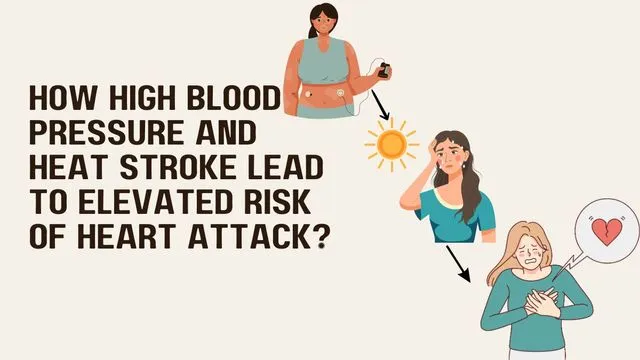- By Priyanka Munshi
- Fri, 17 May 2024 01:11 PM (IST)
- Source:JND
Did you know that high blood pressure (BP), especially during hot weather, might raise the risk of heart attack and heat stroke? Increased heat causes the body to exert more energy to cool down, which puts further strain on the heart. This additional stress might aggravate cardiovascular issues in people with high blood pressure, increasing their susceptibility to heat stroke. Furthermore, dehydration and a sharp drop in blood pressure might result from heat stroke itself, which exacerbates heart problems.
Because the heart finds it difficult to maintain proper blood flow and oxygen delivery in harsh conditions, these circumstances together increase the risk of a heart attack. For those with high blood pressure, it is essential to understand this link and take precautions during hot weather. In a conversation with Jagran English, Dr. Abhishek Sing, a consultant in cardiology at Manipal Hospital in Ghaziabad, discussed high blood pressure, its link to heat stroke, and how it can put you at risk of a heart attack.
According to Dr. Abhishek, high blood pressure is a condition in which the blood exerts such force against the artery walls that it might eventually lead to health problems such as heart disease. It is common, but it can be dangerous if not treated promptly. Individuals with high blood pressure do not experience any symptoms. The only way to tell if you have high blood pressure is to have it checked. It can be treated by making lifestyle changes, including eating healthier, quitting smoking, and increasing physical activity, though some people may still need to take medications.
Additionally, he further added that since heat stroke is the most severe type of heat-related injury, it is considered a medical emergency. It typically happens when the body temperature reaches 104 F (40 C) or higher. This scenario arises when someone is exposed to high temperatures or engages in physical activity during hot weather. Those with high blood pressure may find their lives in danger in this scenario. Excessive heat and high blood pressure put the heart under stress, which can result in a heart attack. To avoid the negative effects of this combination on heart health, it is important to understand the connection between the two health hazards, particularly during the summer.
In cases of high blood pressure, the heart works hard to pump blood through blood vessels. In extremely hot weather conditions, the body diverts blood to the skin to cool itself, causing the heart to pump blood faster. People with already compromised cardiovascular systems due to high blood pressure are at greater risk for heat stroke because of the additional load, said Dr. Abhishek.
What Is The Risk Of A Heart Attack?
At the time of a heat stroke, the heart needs to pump blood faster to cool the body, increasing heart rate and blood flow. However, due to high blood pressure, arteries are narrowed, which leads to an insufficient supply of blood to the heart. Dehydration leads to the thickening of blood and a reduction in blood volume, which leads to the formation of clots and can directly cause a heart attack.
How To Prevent Heat Stroke:
- Keep yourself Hydrated: Consume plenty of liquids to reduce blood pressure.
- Stay Indoors: Avoid going out during peak heat times. Stay indoors or shaded during the hottest parts of the day.
- Clothing: Wear loose, lightweight, and light-colored clothing to help keep your body cool.
- Monitor Blood Pressure: Always keep a check on blood pressure, especially during heat waves.
- Use Cooling Techniques: Take cool showers and use a wet towel or cooling pack to cool down your shoulders, neck, and head.
- Watch For Heat Exhaustion: Signs of heat exhaustion include heavy sweating, weakness, cold and pale skin, and vomiting. If you see any of these signs, get to a cool place, try cooling methods, and rehydrate.
Finally, Dr. Abhishek said that high blood pressure leads to heat stroke, which increases the risk of a heart attack. By understanding the risks and taking the necessary measures, people can manage their health during the summer. Heat stroke is a severe illness caused by extreme heat that can increase the risk of a heart attack. It is important to take preventive measures like staying hydrated and avoiding peak heat hours. For people with high BP, it is crucial to keep a check on symptoms of heat-related illness and visit a medical professional if they see any signs. Educating and creating awareness about the risks and adopting necessary measures can eventually lead to a decrease in severe complications in the future.

